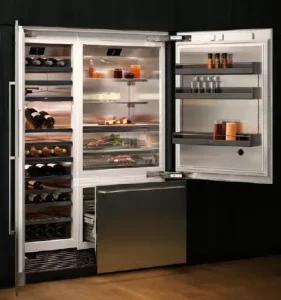 A Comprehensive Guide to Refrigerator Repair
A Comprehensive Guide to Refrigerator Repair
Introduction to Refrigerator Repair
Refrigerators are one of the most essential appliances in our homes, keeping our food fresh and safe to consume. However, even the most reliable refrigerator may encounter issues from time to time. In this blog, we’ll dive into common refrigerator problems, how to fix them, when to call a professional, and some tips for maintaining your fridge to keep it running smoothly.
Understanding the Basics of a Refrigerator
Before diving into specific repair scenarios, let’s first understand the basics of how a refrigerator works and its essential components.
The Refrigeration Cycle
The refrigerator operates on a simple principle: it removes heat from the inside and expels it outside, maintaining a cold environment within. This process, called the refrigeration cycle, involves the compressor, condenser, evaporator, and an expansion device.
Essential Refrigerator Components
Compressor: The heart of the refrigeration system, the compressor pumps refrigerant gas through the system.
Condenser: A set of coils that dissipate heat from the refrigerant gas, turning it into a high-pressure liquid.
Evaporator: A set of coils where the refrigerant absorbs heat from inside the refrigerator, turning it back into a low-pressure gas.
Expansion Device: Regulates the flow of refrigerant into the evaporator, allowing for the cooling process.
Common Refrigerator Issues and Solutions
Now that we understand the basics let’s discuss some common refrigerator problems and their solutions.
Problem 1: Refrigerator Not Cooling
A refrigerator that’s not cooling properly can be caused by several factors, such as dirty condenser coils, a malfunctioning thermostat, or a faulty compressor.
To fix this issue:
- Clean the condenser coils with a brush and vacuum.
- Test the thermostat and replace it if necessary.
- If the compressor is the problem, call a professional.
Problem 2: Strange Noises
Noises coming from your refrigerator can be alarming. Most often, the cause is a faulty fan motor or compressor.
To address this issue:
- Identify the source of the noise.
- If it’s the fan motor, either clean it or replace it.
- If it’s the compressor, call a professional.
Problem 3: Water Leaks
Water leaks can be caused by a clogged defrost drain or a damaged water supply line.
To fix the issue:
- Clear the defrost drain using a mixture of warm water and vinegar.
- If the water supply line is damaged, replace it or call a professional for assistance.
Problem 4: Ice Maker Issues
Ice maker problems can stem from a variety of sources, including a clogged water line, a faulty water inlet valve, or a malfunctioning ice maker assembly.
To resolve these issues:
- Check the water line for blockages and clean it if necessary.
- Test the water inlet valve and replace it if needed.
- If the ice maker assembly is faulty, consider replacing the entire unit or calling a professional.
Problem 5: Door Seal Problems
A damaged or worn-out door seal (gasket) can cause the refrigerator to lose cold air, leading to increased energy consumption and reduced cooling efficiency.
To fix this problem:
- Inspect the door seal for damage or wear.
- Clean the seal with a mild soap and water solution.
- Replace the door seal if necessary.
When to Call a Professional
Evaluating the Problem
While some refrigerator issues can be resolved through DIY methods, others require professional assistance. If you’re unsure about the cause of the problem or feel uncomfortable handling the repair, it’s best to call a professional.
Finding a Reputable Repair Service
To find a reputable refrigerator repair service, consider the following:
- Ask for recommendations from friends, family, or neighbors.
- Read online reviews and testimonials.
- Check for professional certifications and affiliations.
Preventative Maintenance Tips
Cleaning and Maintenance
Regular cleaning and maintenance can prolong the life of your refrigerator and prevent costly repairs. Some tips include:
- Clean the condenser coils every 6-12 months.
- Check and clean the door seals regularly.
- Defrost the freezer as needed to prevent ice buildup.
Proper Usage and Storage
Using your refrigerator correctly and storing food properly can help prevent issues and extend its lifespan. Follow these guidelines:
- Avoid overloading the refrigerator, as it can strain the compressor and reduce efficiency.
- Store food in airtight containers to prevent odors and maintain freshness.
- Allow hot food to cool before placing it in the refrigerator.
Conclusion
A well-maintained refrigerator can serve you for years without major issues. By understanding the basics of refrigerator operation, addressing common problems, and practicing preventative maintenance, you can keep your fridge running efficiently and save on repair costs. If in doubt, don’t hesitate to call a professional for assistance.
FAQs
Q: How often should I clean my refrigerator?
A: It’s recommended to clean the interior of your refrigerator every 3-4 months and the condenser coils every 6-12 months.
Q: What’s the ideal temperature setting for my refrigerator and freezer?
A: The recommended temperature for your refrigerator is 37°F (3°C) and 0°F (-18°C) for the freezer.
Q: How long do refrigerators typically last?
A: A well-maintained refrigerator can last between 10-20 years, depending on the brand and model.
Q: Can I use an extension cord for my refrigerator?
A: It’s best to avoid using extension cords, as they can pose a fire risk and reduce the appliance’s efficiency. Instead, plug your refrigerator directly into a dedicated outlet.
Q: How can I dispose of my old refrigerator responsibly?
A: Contact your local waste management facility or a professional appliance recycling service for proper disposal and recycling options.

